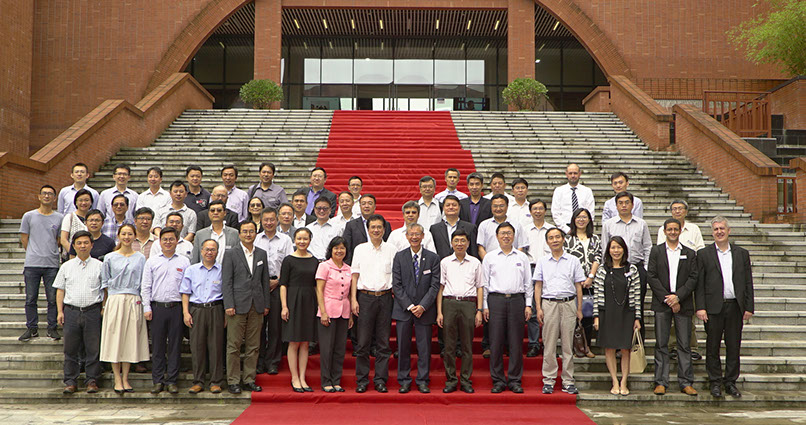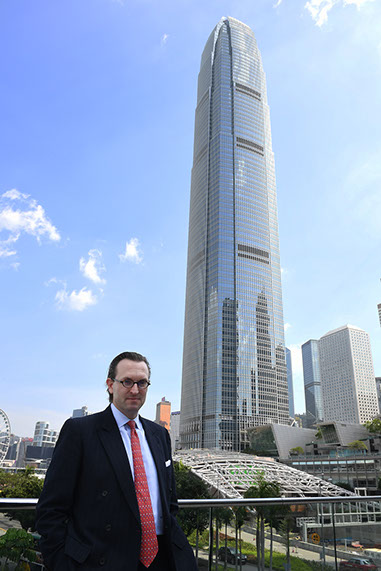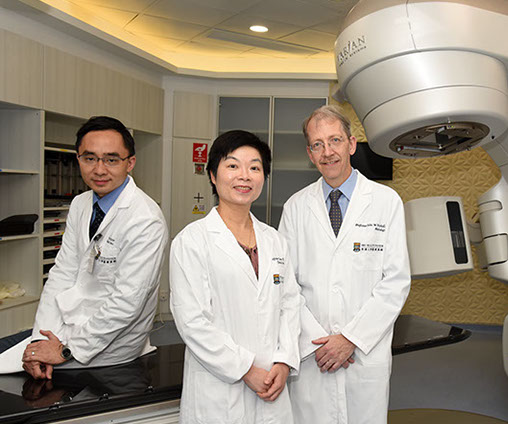Vision and Mission
Message from the
President and
Vice-Chancellor
Teaching and Learning
Research and Innovation
Knowledge Exchange and
Technology Transfer
The University Profile
An Extract from
the University’s
Annual Accounts 2016-17
Officers of the University
The Court
Vision and Mission
Message from the
President and
Vice-Chancellor
Teaching and Learning
Research and Innovation
Knowledge Exchange and
Technology Transfer
The University Profile
An Extract from
the University’s
Annual Accounts 2016-17
Officers of the University
The Court

The Review 2017

PDF Version
Past Issues
E-Book
RESEARCH AND INNOVATION
ADDED-VALUE PARTNERSHIPS
Collaborations with Mainland and international partners have raised the visibility and citations of HKU scholars. The Field-Weighted Citation Impact for 2011–15 showed that while research by HKU-only authors had a rating of 1.44 (0.77 is the global average), when global partners were involved the rating multiplied to 7.42 with Harvard co-authors (Harvard-only papers were 1.31), 8.77 with University of Sydney co-authors (Sydney-only papers were 1.93) and 3.45 with National University of Singapore co-authors (NUS-only papers were 1.42). Examples of collaborative partnerships are given below.

Delegates at the ZIRI Summer Symposium, June 2017.
Mainland Ventures
HKU is aiming to build on its strengths to establish itself as a regional knowledge hub. Its scholars have active collaborations with academic and industry partners in Mainland China and in 2017 they participated in 140 joint publications and received 133 joint grants. The University is also strengthening its institutional presence on the Mainland, most prominently through the HKU-Zhejiang Institute of Research and Innovation (ZIRI), a 33,800-square-metre complex with expansive laboratories. HKU-ZIRI signed three industry collaborations in June 2017 focused on industrial noise control, food packaging and environmentally-friendly materials, and held a major symposium.
The University also secured physical space in Shenzhen for HKU-SIRI which will be ready for occupancy in early 2018. Meanwhile, in July 2017 the HKU-Shenzhen Hospital, which provides research, clinical and teaching opportunities, celebrated its fifth anniversary. The hospital also recently received 3A accreditation, the highest level available on the Mainland.
Other notable examples of engagement on the Mainland include a partnership with the Southern University of Science and Technology in Guangdong to offer joint PhDs, which admitted 17 students in 2016–17, the new Consortium on Translational Medicine involving HKU, Shanghai Jiaotong University and the Hong Kong Science and Technology Park that will have an initial focus on drug discovery and development, and a multilateral collaboration on poverty alleviation involving HKU, Fudan University, the World Bank and the International Poverty Reduction Centre in China.

FinTech Horizon
Legal scholars from HKU, the University of New South Wales and the University of Luxembourg are collaborating on a major project looking at the law and regulation of financial technologies (FinTech). The team, whose HKU leader is Professor Douglas Arner, Kerry Holdings Professor in Law, is working with regulators and other scholars to consider issues such as smart regulation and the risks arising from information technology. Professor Arner also leads a Theme-based Research Scheme project titled Enhancing Hong Kong’s Future as a Leading International Financial Centre and is involved in Asia’s first FinTech Massive Open Online Course, which was launched by HKU in autumn 2017.
HKU team leader Professor Douglas Arner.
Immunotherapy Breakthrough
An eight-year programme of collaboration and clinical trials to treat nasopharyngeal cancer using T-cell immunotherapy has yielded promising results for patients. The research, conducted by the Li Ka Shing Faculty of Medicine with QIMR Berghofer Medical Research Institute in Australia, showed the treatment improved control of the disease in 60 per cent of patients with aggressive metastatic cancer, and held promise as a preventative treatment for other patients who had received standard treatment but were at risk of recurrence. The Faculty will have the capacity for more such targeted medicine when the first phase of the $1.244 billion redevelopment of Grantham Hospital is completed in 2024.

Immunotherapy research team (from left) Dr Victor Lee Ho-fun, Professor Dora Kwong Lai-wan and Professor John Nicholls.